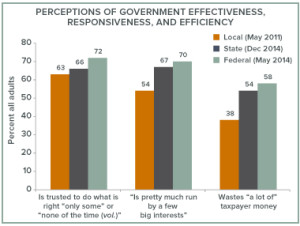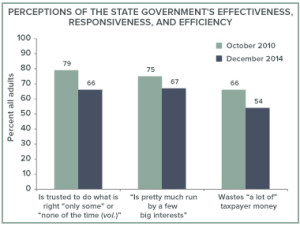(Editor’s note: Yesterday Mark Baldassare, president and CEO of the Public Policy Institute of California testified before the Little Hoover Commission about interactions between state government and the public. His testimony is below.)
Thank you for the opportunity to contribute to your important and timely discussion about improving the delivery of public services and better engaging Californians with their state government. I have been asked in my testimony to set the stage for your work by helping you to better understand current public sentiment toward state government.
Last year, voter turnout in California reached a historic low: 30.9 percent of eligible adults in the November general election and 18.4 percent in the June primary. Millions of Californians who could register to vote did not, and millions of Californians who could vote opted out. These numbers clearly point to a California public that is disconnected from their state government today.
This is consistent with what we have observed in the Public Policy Institute of California (PPIC) Statewide Survey since we began monitoring Californians’ attitudes toward government in the late 1990s. We have been asking questions about government trust focused on effectiveness, responsiveness, and efficiency at the local, state, and federal levels. And we have found that Californians’ distrust in state government predates the low voter turnouts of the 2014 election.
My purpose is to provide information on the magnitude of public distrust in state government today, the differences among demographic groups, and how current levels of distrust compare with the past. I will also contrast opinions about government at the local, state, and federal levels. Lastly, I will talk about the implications of our findings for state government leaders.
The source of most of my comments about trust in state government today is the PPIC Statewide Survey: Californians and the Future report from December 2014, which I coauthored with PPIC colleagues Dean Bonner, Renatta DeFever, Lunna Lopes, and Jui Shrestha. Our latest findings on trust in state government are based on interviews with 1,704 adult residents throughout California from November 10 to November 17, conducted in English or Spanish and by landline or cell phone with a sampling error of ± 3.7 percent.
We asked our tracking question on government effectiveness, “How much of the time do you think you can trust the state government in Sacramento to do what is right?”—and only one in three Californians said just about always (7%) or most of the time (25%). Two in three Californians said that you can trust the state government to do what is right only some of the time (61%), or volunteered that they trust it none of the time (5%). These perceptions are shared across regional and demographic groups. Republican and independent voters express more distrust in state government than Democratic voters do. In our polling a decade ago, the results for this question were similar. However, perceptions have improved somewhat since October 2010 (3% always, 15% most of the time, 67% most, 12% none).
Responding to our tracking question on government responsiveness, 67 percent of California adults said “the state government is pretty much run by a few big interests looking out for themselves,” while only 28 percent said that “it is run for the benefit of all of the people.” Majorities across regional and demographic groups perceive the state government as pretty much run by a few big interests looking out for themselves, and Republican and independent voters are more likely to express this negative view than Democratic voters are. Again, the results were similar a decade ago, while perceptions have improved somewhat since October 2010 (75% big interests, 17% all of the people).
In our tracking question on government efficiency, 54 percent of adults said they “think the people in state government waste a lot of the money that we pay in taxes,” 35 percent said “people in state government waste some of it,” and 8 percent said they “don’t waste very much of it.” Majorities across most regional and demographic groups hold the perception that the people in state government waste a lot of money, while Republican (78%) and independent voters (60%) hold this view much more often than Democratic voters (46%) do. Once again, the results were similar in our polling a decade ago, while perceptions have improved somewhat since October 2010 (66% a lot, 26% some, 6% don’t waste very much).
 We asked the same three questions on effectiveness, responsiveness, and efficiency about the federal government in our May 2014 poll and about local government in our May 2011 poll. State government fares only slightly better than the federal government in ratings of trust. Local government fares the best of all levels. Californians are much less likely to say their local governments “waste a lot of the money paid in taxes” or are “pretty much run by a few big interests looking out for themselves.” They are slightly less likely to say that they can trust their local governments “to do what is right only some of the time or none of the time.”
We asked the same three questions on effectiveness, responsiveness, and efficiency about the federal government in our May 2014 poll and about local government in our May 2011 poll. State government fares only slightly better than the federal government in ratings of trust. Local government fares the best of all levels. Californians are much less likely to say their local governments “waste a lot of the money paid in taxes” or are “pretty much run by a few big interests looking out for themselves.” They are slightly less likely to say that they can trust their local governments “to do what is right only some of the time or none of the time.”
In summary, the negative perceptions about the effectiveness, responsiveness, and efficiency of state government are consistent over time and widely held in the public today. What are the implications of our findings for state government leaders? First, Californians will continue to value the citizens’ initiative process as they seek to have a say in the major decisions made by their state government. Second, many Californians will be skeptical about the need for higher state taxes and more state revenues, given their level of distrust in their state government. Third, proposals to move authority and control to the local level will resonate with Californians, given their higher levels of distrust in state government. Last but not least, civic disengagement will continue to be a problem. We may reach new lows in voter participation given the level of distrust in government.
 I’d like to close on a more hopeful note. This commission’s work comes at a time when we are seeing some improvements in all three indicators of trust in state government. In the wake of a growing economy and better fiscal situation, the approval ratings of the governor and state legislature are also on the rise, as our survey results show. The voters have also approved a series of major legislative and fiscal reforms in recent elections. In our polling, the public is signaling their early support for local control of school funding and state-local corrections realignment.
I’d like to close on a more hopeful note. This commission’s work comes at a time when we are seeing some improvements in all three indicators of trust in state government. In the wake of a growing economy and better fiscal situation, the approval ratings of the governor and state legislature are also on the rise, as our survey results show. The voters have also approved a series of major legislative and fiscal reforms in recent elections. In our polling, the public is signaling their early support for local control of school funding and state-local corrections realignment.
It will take time to see whether these reforms and changes satisfy a distrustful public. I’m optimistic that we are poised to make gains in trust in state government over the next few years, and this is an area where California could lead the nation. New efforts toward building trust in state government will pay dividends in the form of citizen engagement. They are important for the future of all Californians.

